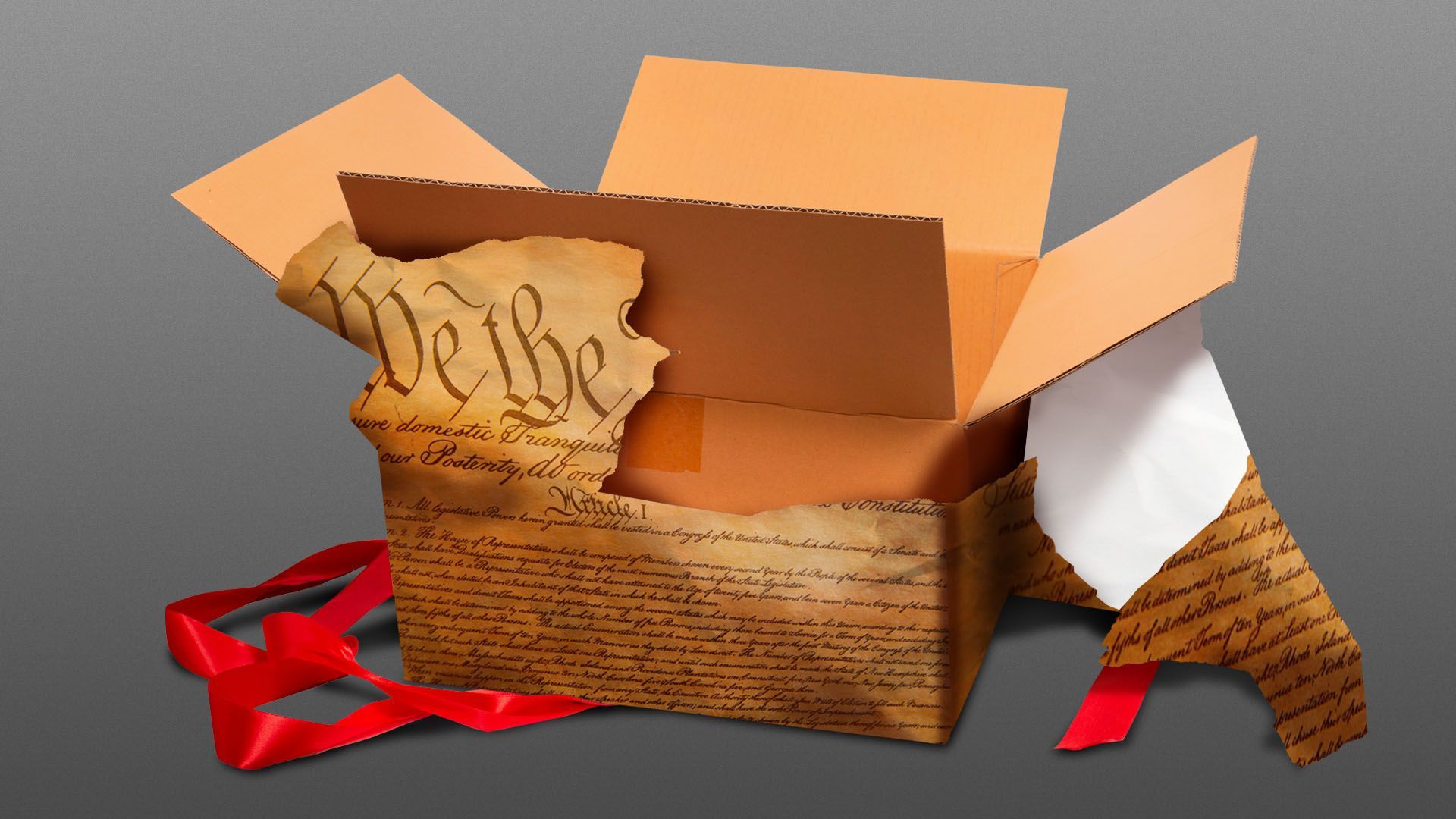
Illustration: Sarah Grillo/Axios
President Trump has faced immense blowback after he deemed it "stupid" to reject an unprecedented $400 million jet gifted by the Qatari royal family.
The big picture: Critics contend that accepting the luxury Boeing 747-8 jet could be a constitutional violation — to be precise, some have said it oversteps the foreign emoluments clause.
Catch up quick: ABC News first reported the possible deal ahead of Trump's Gulf trip, which included a stop in Qatar in mid-May.
- Trump, in a Sunday Truth Social post, characterized the situation as the Defense Department "getting a GIFT, FREE OF CHARGE, of a 747 aircraft to replace the 40 year old Air Force One, temporarily, in a very public and transparent transaction."
- He's also said the plane would go to his presidential library and that he would not use it after leaving office, suggesting that it would be decommissioned.
- White House Press Secretary Karoline Leavitt has said that any gifts from foreign governments are "always accepted in full compliance with all applicable laws," but even some Republicans and Trump loyalists are wary of the idea.
State of play: The plane would be a historically massive gift — one that experts say poses clear ethical and national security concerns but presents murkier legal ground.
What is an emolument?
Simply, an emolument is any salary, fee or profit from employment or holding office.
- Article I of the Constitution states that "no Person holding any Office of Profit or Trust under them, shall, without the Consent of the Congress, accept of any present, Emolument, Office, or Title, of any kind whatever, from any King, Prince, or foreign State."
- Article II prohibits the commander-in-chief from receiving any emolument from the states.
Yes, but: Congress has allowed presidents and federal employees to keep gifts from a foreign government as long as they don't exceed $480, Axios' Sareen Habeshian and Noah Bressner report.
During his first term, Trump faced multiple lawsuits over alleged violations of the emoluments clauses, priming the courts to take up historic litigation.
- But the Supreme Court ultimately vacated lower courts' decisions after Trump's 2020 loss.
What do legal experts say about the Air Force One conundrum?
For legal experts who spoke with Axios, whether or not the gift represents a Constitutional violation relies on the details of the deal under which the jet is accepted.
- Either way, it's created an "ethical headache," said Jessica Tillipman, The George Washington University Law School's associate dean for government procurement law studies, who specializes in corruption issues.
Daniel Weiner, the director of the Brennan Center's Elections and Government Program, told Axios that if the jet is accepted by the U.S. government and remains in the possession of the U.S. government, "it doesn't really pose an Emoluments Clause issue."
- He said it's a different story if there is any provision where the jet is transferred out of the government's custody to "some sort of private foundation, and then potentially made available for President Trump's use after he leaves office as a private citizen."
Context: "The key question is: Does it remain in the possession of the United States, or is it transferred to some sort of private foundation?" Weiner said.
- While Trump and several other government officials on either side of the political aisle have been accused of pushing the emoluments envelope, "the legality of ... these arrangements has not really been settled," Weiner noted.
While Tillipman said the legal question posed by the deal is murky, the language of the clause is straightforward — the president would need congressional approval to accept such a gift.
- "It's not clear to me that he's either sought their approval or [that] he ever intends to seek their approval," she said. But she added that the legal question is separate from the ethical one.
- "You have to divorce the legal from the ethical from the national security. They're all different lines of concern."
Threat level: Noah Bookbinder, the president of Citizens for Responsibility and Ethics in Washington (CREW), echoed that point, telling Axios, "This is conduct that is incredibly troubling, whether or not it ends up being a constitutional violation," raising concerns about foreign influences impacting a president's decision-making.
- He also emphasized that the safety of Air Force One is of "the utmost national security concern" — and that accepting an aircraft from a foreign government may not be the most ideal way to safeguard that priority.
- CREW filed suit against Trump during his first term, alleging he illegally received payments from foreign governments via his business dealings.
The bottom line: The emoluments clause is not an "outright prohibition" on accepting foreign gifts, Weiner said. Rather, "it says that you can't accept these things without the consent of Congress."
- A "big issue," he said, is that "Congress has really not lived up to its role."
- He continued, "The reason that this is such a gray area, in part, is that Congress is not active."
Go deeper: Ben Shapiro, Laura Loomer lead rare MAGA backlash to Trump's Qatari jet